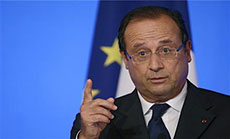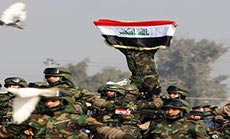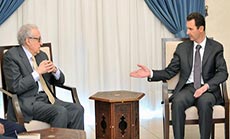Opposition Protesters Encircle Presidential Palace

Local Editor
Tens of thousands of Egyptian demonstrators encircled the presidential palace Tuesday after riot police failed to keep them at bay with tear gas, in a growing crisis over President Mohamed Mursi's decree widening his powers.
 According to agencies, the protesters cut through barbed wire a few hundred meters from the palace, prompting police to fire the tear gas before retreating and allowing demonstrators to reach the palace walls.
According to agencies, the protesters cut through barbed wire a few hundred meters from the palace, prompting police to fire the tear gas before retreating and allowing demonstrators to reach the palace walls.
Meanwhile, Mursi himself was not in the palace. A security official said "the president of the republic left the Itihadiya palace on schedule after official meetings".
A video posted online by the Egyptian news network Rassd showed a convoy leaving the palace through a riot police cordon as protesters chanted "coward" and "leave".
In Tahrir Square, where other protesters had rallied, the spokesman for an alliance of opposition groups, the National Rescue Front, announced a sit-in outside the palace and called for similar actions across the country.
Demonstrators, many from liberal and leftist movements, banged on lamp posts and chanted "leave" in a thunderous show of force.
Most left later in the night, leaving behind roughly two thousand protesters as some set up about a dozen tents for the night outside the palace walls, which had been covered in anti-Mursi graffiti.
In the central province of Minya, clashes flared between opponents and supporters of Mursi outside the headquarters of his Freedom and Justice Party, the political arm of the Muslim Brotherhood.
Anti-Mursi protests also erupted in the Mediterranean city of Alexandria and the central province of Sohag, with the spreading unrest prompting US appeals for restraint.
Tuesday's protests are the latest in a string of actions opposed to Mursi's November 22 decree, which expanded his powers and enabled him to put to a mid-December referendum a draft constitution drawn up by his dominated panel and rejected by others.
Outside the palace, the demonstrators waved Egyptian flags, chanting for the regime's downfall and denouncing the Brotherhood for having "sold the revolution" that toppled longtime leader Hosni Mubarak last year.
Mursi, who took office in June, insists the measures are aimed at ending a tumultuous transition following the 2011 uprising.
But his opponents have accused him of choosing the same path of autocracy that finally cost Mubarak his presidency.
The decision to go to a referendum on December 15 caused further upheaval, including within the judiciary itself.
On Monday, the Supreme Judicial Council said it would ensure judicial supervision of the referendum, despite calls for a boycott by some colleagues, including the influential Judges Club that represents judges nationwide.
Source: News Agencies, Edited by moqawama.org
Comments
- Related News

France’s Hollande in Qatar for Warplane Deal
9 years ago
Iraq Police Dismantles Al-Qaeda Protest Site
10 years ago

